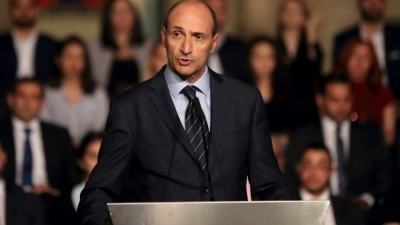Greece rail crash: At least 43 killed and scores injured after two trains collide

Greece’s transport minister resigned on Wednesday after a passenger train collided head-on with a cargo train, throwing entire carriages off the tracks and killing at least 43 people, many of them students, in the country’s deadliest rail crash in living memory. Officials said the death toll was expected to rise further as temperatures in one carriage rose to 1,300 degrees after it was engulfed in flames. Passengers described a “nightmarish” crash which shattered their train just before midnight on Tuesday near the central town of Larissa. It was headed to the northern city of Thessaloniki, from the capital Athens, after a long holiday weekend. Many kicked through windows to escape the inferno, others were flung up to 40m on impact. “There was panic ... the fire was immediate, as we were turning over we were being burned, fire was right and left,” said Stergios Minenis, a 28-year-old passenger who jumped to safety from the wreckage. Another passenger, who escaped from the fifth carriage, told Skai TV: “Windows were being smashed and people were screaming ... One of the windows caved in from the impact of iron from the other train.” A station master was arrested as investigators tried to understand why the two trains had been on the same track. Transport minister Kostas Karamanlis submitted his resignation, saying he was taking responsibility for the state’s “long-standing failures” to fix a railway system he said was not fit for the 21st century. Rescuers scoured the smouldering mangled mass of steel in the morning, and cranes lifted derailed carriages, their windows blown out. Fire brigade spokesman Vassilis Varthakogiannis said the temperatures in the first carriage made it hard to identify those trapped inside, or say how many died exactly. “The confirmed number of dead is 36 but based on these facts, and the findings from the scene of the tragedy, the number is expected to be greater.” The confirmed death toll subsequently rose to 43, Rubrini Leontari, the chief coroner at Larissa’s general hospital, told local media. Flags flew at half-mast in Athens, as well as in Brussels, in a tribute to the victims of the crash, as the government declared three days of national mourning. “It’s an unthinkable tragedy. Our thoughts today are with the relatives of the victims,” prime minister Kyriakos Mitsotakis said at the site of the crash, looking shattered. In Larissa, where many victims of the crash had been taken, Nikos Makris sat on a pavement outside the hospital. His wife’s sister was travelling in one of the first two carriages. “She is missing. We have been waiting here since 2a.m,” he said. “Now we are waiting to do a DNA test. We will be lucky to have a body to bury,” he said. Others were angry. The relative of one victim shouted: “Some bastard has to pay for this.” The head of the emergency unit in Larissa hospital, Apostolos Komnos, said most of the dead were young people, in their 20s. The local station master, in charge of signalling, has been arrested and charged with causing mass deaths through negligence and causing grievous bodily harm through negligence, a police official said. The 59-year-old man has denied any responsibility for the accident, attributing it to a possible technical failure, the official said. The two trains had been running towards each other on the same track “for many kilometres” before the crash, government spokesman Giannis Oikonomou said. Yiannis Ditsas, head of the Greek railway workers’ union, told Skai television that automatic signalling at the spot of the crash had not been working. There was no immediate official comment on this. The passenger train was carrying 342 travellers and 10 crew, while two crew were on the cargo train, according to Hellenic Train data. Sixty-six of those injured were hospitalised, six of whom were in intensive care, a fire brigade official said. Survivors who did not need to be hospitalised were evacuated to Thessaloniki, where one woman ran to embrace her daughter as she disembarked from a bus with other survivors. “Mum don’t, I’m hurt,” the daughter said. Another woman, who was waiting there, said her child was not picking up the phone. The cargo train had been travelling from Thessaloniki to Larissa. Local media said the train left Athens at around 7.30pm (5.30pm Irish time). The fire brigade said it was informed of the accident shortly before midnight. Greece sold railway operator Trainose to Italy’s Ferrovie dello Stato Italiane in 2017 as part of its international bailout programme, expecting hundreds of millions of euro to be invested in rail infrastructure in the coming years. According to the Italian company’s website, it is the main provider of rail transport for passengers and freight in Greece and runs 342 passenger and commercial routes a day. – Reuters
German state governor under pressure over Nord Stream 2 revelations
Macron attempts to re-assert waning French influence on central African trip
:quality(70)/cloudfront-eu-central-1.images.arcpublishing.com/irishtimes/EG4MK72S3X77ID4MZU5ILB6Q6M.jpg)
French assembly driven to brink as politicians overindulge in alcohol
:quality(70)/cloudfront-eu-central-1.images.arcpublishing.com/irishtimes/ZRMID67VCLDKOROA6FKGPRMOSQ.jpg)
Windsor Framework prompts round of soul-searching in Britain about its past aggressive approach to EU
:quality(70)/cloudfront-eu-central-1.images.arcpublishing.com/irishtimes/IPRESX4WSHNQBYEKWPU5DQZWFI.jpg)
:quality(70)/cloudfront-eu-central-1.images.arcpublishing.com/irishtimes/YZSLSIZIQDIEIJA2MX6N7BOUIQ.jpg)
:quality(70)/cloudfront-eu-central-1.images.arcpublishing.com/irishtimes/AVBNI6DQUDHNJOUZSEH3CQTPBU.jpg)



